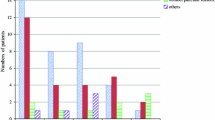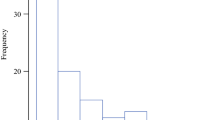Abstract
This study evaluates compliance and persistence in adjuvant endocrine breast cancer (BC) therapy by clearly analyzing reasons of therapy cessation by differentiating clinical meaningful situations. In order to illuminate the complex field of personal motivation to therapy, a single institution study with a more individual-based approach might better be suited to provide a detailed case documentation than the more epidemiologic approach of large database studies. An unselected cohort of 698 patients (≤80 years) diagnosed with hormonal receptor-positive BC from 1997 to 2008 at the University Hospital Basel, Switzerland, was analyzed. The term “non-persistence” was exclusively used for patients where the discontinuation of endocrine therapy (ET) could have been modified by more intensive care and improved counseling (e.g., in women who lost faith/motivation to therapy or those who suffered from therapy-related side effects). These cases must be differentiated from cases where therapy cessation was inevitable (e.g., due to recurrent disease or severe intercurrent illness). Out of the 685 patients to whom ET was recommended, 42 patients (6.1%) refused and never began treatment (non-compliance). Women younger than 50 were more likely to be non-compliant (P < 0.001). 12.9% of the patients who started therapy were non-persistent to therapy. Patients who were treated by general practitioners tended to be non-persistent more often compared to those treated by oncologists (17.7% vs. 11.3%; P = 0.07). The aim of a non-persistence rate between 10 and 15% is realistic when patients are treated by specialized oncologists. Interventions are needed to support patients, particularly the younger ones, to comply with therapy. Efforts should be made to make sure that all physicians, above all general practitioners, who are involved in BC treatment, are provided with current knowledge as to guarantee an optimal patient management.
Similar content being viewed by others
References
Chlebowski RT, Geller ML (2006) Adherence to endocrine therapy for breast cancer. Oncology 71(1–2):1–9
Hadji P (2010) Improving compliance and persistence to adjuvant tamoxifen and aromatase inhibitor therapy. Crit Rev Oncol Hematol 73(2):156–166
Partridge AH (2006) Non-adherence to endocrine therapy for breast cancer. Ann Oncol 17(2):183–184
Atkins L, Fallowfield L (2006) Intentional and non-intentional non-adherence to medication amongst breast cancer patients. Eur J Cancer 42(14):2271–2276
Barron TI, Connolly R, Bennett K, Feely J, Kennedy MJ (2007) Early discontinuation of tamoxifen: a lesson for oncologists. Cancer 109(5):832–839
Demissie S, Silliman RA, Lash TL (2001) Adjuvant tamoxifen: predictors of use, side effects, and discontinuation in older women. J Clin Oncol 19(2):322–328
Fink AK, Gurwitz J, Rakowski W, Guadagnoli E, Silliman RA (2004) Patient beliefs and tamoxifen discontinuance in older women with estrogen receptor—positive breast cancer. J Clin Oncol 22(16):3309–3315
Guth U, Huang DJ, Schotzau A, Zanetti-Dallenbach R, Holzgreve W, Bitzer J, Wight E (2008) Target and reality of adjuvant endocrine therapy in postmenopausal patients with invasive breast cancer. Br J Cancer 99(3):428–433
Hershman DL, Kushi LH, Shao T, Buono D, Kershenbaum A, Tsai WY, Fehrenbacher L, Lin Gomez S, Miles S, Neugut AI (2010) Early discontinuation and nonadherence to adjuvant hormonal therapy in a cohort of 8, 769 early-stage breast cancer patients. J Clin Oncol 28(27):4120–4128
Lash TL, Fox MP, Westrup JL, Fink AK, Silliman RA (2006) Adherence to tamoxifen over the five-year course. Breast Cancer Res Treat 99(2):215–220
Owusu C, Buist DS, Field TS, Lash TL, Thwin SS, Geiger AM, Quinn VP, Frost F, Prout M, Yood MU et al (2008) Predictors of tamoxifen discontinuation among older women with estrogen receptor-positive breast cancer. J Clin Oncol 26(4):549–555
Partridge AH, LaFountain A, Mayer E, Taylor BS, Winer E, Asnis-Alibozek A (2008) Adherence to initial adjuvant anastrozole therapy among women with early-stage breast cancer. J Clin Oncol 26(4):556–562
Partridge AH, Wang PS, Winer EP, Avorn J (2003) Nonadherence to adjuvant tamoxifen therapy in women with primary breast cancer. J Clin Oncol 21(4):602–606
Silliman RA, Guadagnoli E, Rakowski W, Landrum MB, Lash TL, Wolf R, Fink A, Ganz PA, Gurwitz J, Borbas C et al (2002) Adjuvant tamoxifen prescription in women 65 years and older with primary breast cancer. J Clin Oncol 20(11):2680–2688
Waterhouse DM, Calzone KA, Mele C, Brenner DE (1993) Adherence to oral tamoxifen: a comparison of patient self-report, pill counts, and microelectronic monitoring. J Clin Oncol 11(6):1189–1197
Ziller V, Kalder M, Albert US, Holzhauer W, Ziller M, Wagner U, Hadji P (2009) Adherence to adjuvant endocrine therapy in postmenopausal women with breast cancer. Ann Oncol 20(3):431–436
Edge S, Byrd D, Compton C, Fritz A, Greene F, Trotti A (eds) (2009) AJCC cancer staging manual, 7th edn. Springer, New York
Sobin L, Gospodarowicz M, Wittekind C (eds) (2009) UICC: TNM classification of malignant tumors, 7th edn. Wiley-Blackwell, Oxford
Andrade SE, Kahler KH, Frech F, Chan KA (2006) Methods for evaluation of medication adherence and persistence using automated databases. Pharmacoepidemiol Drug Saf 15(8):565–574 discussion 575–567
Osterberg L, Blaschke T (2005) Adherence to medication. N Engl J Med 353(5):487–497
Coates AS, Keshaviah A, Thurlimann B, Mouridsen H, Mauriac L, Forbes JF, Paridaens R, Castiglione-Gertsch M, Gelber RD, Colleoni M et al (2007) Five years of letrozole compared with tamoxifen as initial adjuvant therapy for postmenopausal women with endocrine-responsive early breast cancer: update of study BIG 1–98. J Clin Oncol 25(5):486–492
Coombes RC, Hall E, Gibson LJ, Paridaens R, Jassem J, Delozier T, Jones SE, Alvarez I, Bertelli G, Ortmann O et al (2004) A randomized trial of exemestane after two to three years of tamoxifen therapy in postmenopausal women with primary breast cancer. N Engl J Med 350(11):1081–1092
Fisher B, Costantino J, Redmond C, Poisson R, Bowman D, Couture J, Dimitrov NV, Wolmark N, Wickerham DL, Fisher ER et al (1989) A randomized clinical trial evaluating tamoxifen in the treatment of patients with node-negative breast cancer who have estrogen-receptor-positive tumors. N Engl J Med 320(8):479–484
Forbes JF, Cuzick J, Buzdar A, Howell A, Tobias JS, Baum M (2008) Effect of anastrozole and tamoxifen as adjuvant treatment for early-stage breast cancer: 100-month analysis of the ATAC trial. Lancet Oncol 9(1):45–53
Goldhirsch A, Wood WC, Gelber RD, Coates AS, Thurlimann B, Senn HJ (2007) Progress and promise: highlights of the international expert consensus on the primary therapy of early breast cancer 2007. Ann Oncol 18(7):1133–1144
Grunfeld EA, Hunter MS, Sikka P, Mittal S (2005) Adherence beliefs among breast cancer patients taking tamoxifen. Patient Educ Couns 59(1):97–102
Compas BE, Stoll MF, Thomsen AH, Oppedisano G, Epping-Jordan JE, Krag DN (1999) Adjustment to breast cancer: age-related differences in coping and emotional distress. Breast Cancer Res Treat 54(3):195–203
Ganz PA, Schag CC, Heinrich RL (1985) The psychosocial impact of cancer on the elderly: a comparison with younger patients. J Am Geriatr Soc 33(6):429–435
Hong S, Didwania A, Olopade O, Ganschow P (2009) The expanding use of third-generation aromatase inhibitors: what the general internist needs to know. J Gen Intern Med 24(Suppl 2):S383–S388
Conflict of interest
The authors declare that there are no financial or personal relationships with other people or organizations that could inappropriately influence the work reported or the conclusions, implications, or opinions stated.
Author information
Authors and Affiliations
Corresponding author
Rights and permissions
About this article
Cite this article
Güth, U., Myrick, M.E., Kilic, N. et al. Compliance and persistence of endocrine adjuvant breast cancer therapy. Breast Cancer Res Treat 131, 491–499 (2012). https://doi.org/10.1007/s10549-011-1801-y
Received:
Accepted:
Published:
Issue Date:
DOI: https://doi.org/10.1007/s10549-011-1801-y




